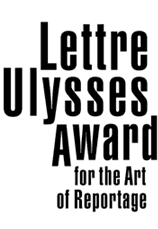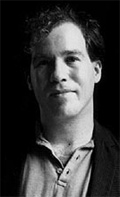
Mark Danner, USA

”Are the historical and the observer-on-the-scene personas somehow separated? I don’t think so, because the person gathering information and trying to see what is different, trying to detail – it’s the eye trying to detail what this place looks like and how it’s interesting, how it is puzzling and how one can get to the end and tell what happened -- which is really the point in the end: to tell what happened. The historical part has to do with that, because in the end you are trying to tell not only how it happened, but why, to make it make sense. If you do, that is where your job ends and the reader’s begins.”
Essayist, reporter, editor and professor. Mark David Danner was born in Utica, New York in 1958. Danner’s father, a dentist, worked during the Second World War as a gunner on an aircraft carrier in the South Pacific, and through his stories, he taught his son early about the importance of historical background. Danner attended the John F. Hughes School and Utica Free Academy. There, during his studies, he worked for The Corridors, the student magazine named Best Student Newspaper in New York during his senior year. Mark Danner studied modern literature and aesthetics at Harvard University, graduating in 1981. He then spent three years working as an editorial assistant for the New York Review of Books. In 1984, Danner became chief editor at Harper’s Magazine. He started writing for the New York Times Magazine in 1986, heading the foreign affairs section.
In December 1989, the New Yorker published Danner’s three-part series about Haiti, Beyond the Mountains, which received the National Magazine Award for Reporting. Soon afterwards, he joined the staff of the New Yorker. His book Beyond the Mountains: The Legacy of Duvalier (Pantheon Books) was published in 1993, arising out of his reportage on Haiti.
In his extended reportage The Truth of El Mozote (The New Yorker, December 1993), Danner investigated a massacre in a village in El Salvador in 1981. There, around one thousand civilians were murdered by US-educated Salvadorian soldiers, although this was continually denied by the Reagan government. For this piece, the New Yorker devoted an entire issue to a single article for the second time since its inception. Based on his research, Danner published the book The Massacre at El Mozote: A Parable of the Cold War (Vintage, 1994).
After the presidential elections in the year 2000, Mark Danner researched the unclear conditions of the vote re-count in Florida. An article about the topic was published by the New York Review of Books in 2001 and in 2004 his book on the subject, The Road to Illegitimacy: What Really Happened in the 2000 Florida Vote Re-Count (Melville House Publishing), was published.
Danner has been reporting from Iraq for the New Yorker and the New York Review of Books since 2003. In his most recent book Torture and Truth: America, Abu Ghraib and the War on Terror (New York Review of Books, 2004), he investigates the torture scandal in Abu Ghraib and other cases of the torture of prisoners in Iraq, Afghanistan and in Guantanamo. He documents human rights abuses through his own research, statements from the US government and Red Cross reports.
Mark Danner has won numerous awards, including an Emmy, three Overseas Press Club Awards, and a National Magazine Award. In 1999 he was named a MacArthur Fellow. He has taught journalism at the University of California in Berkeley since 1998. In 2002, he became the head of the Goldman Forum on the Press and Foreign Affairs there. He also teaches at New York’s Bard College.
Mark Danner speaks English, French and Spanish and lives in New York and San Francisco.
